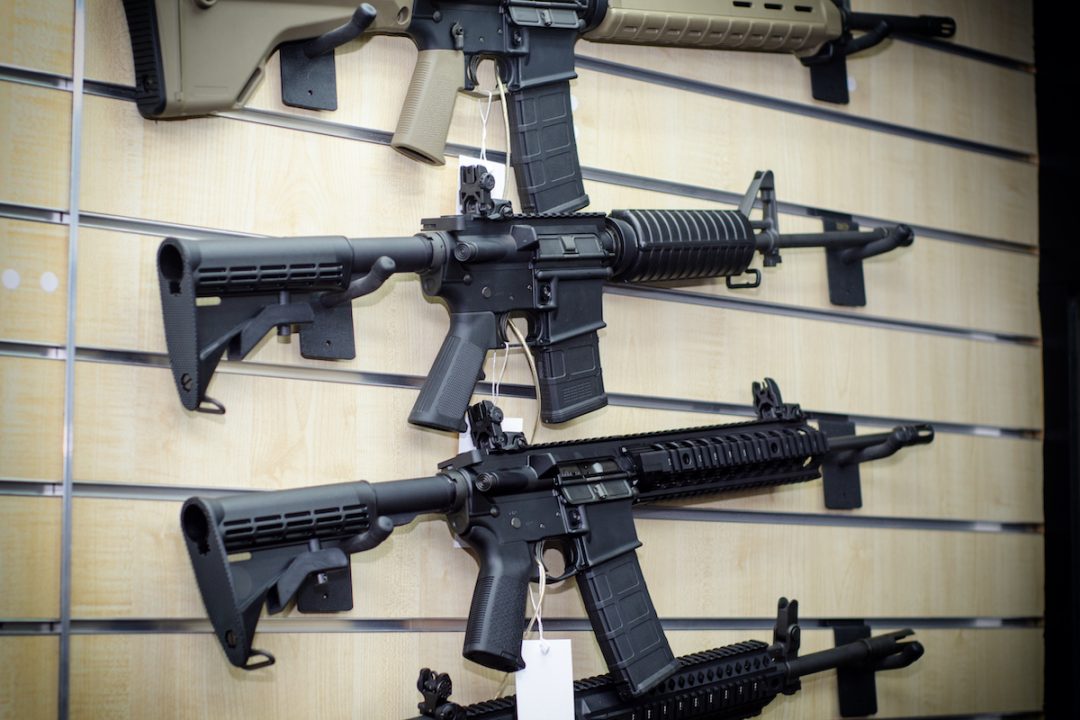by Bob Adelmann December 5, 2024 ( December 5, 2024 )
 artas/iStock/Getty Images Plus
artas/iStock/Getty Images Plus
On Monday, a judge summarily dismissed a lawsuit instigated by the anti-gun Brady group through its legal arm, Brady Legal. The group sought to damage the American gun industry — specifically Smith & Wesson — claiming that S&W and many others named as defendants were somehow guilty in the synagogue shooting in Poway, California, in April 2019.
The shooter, John Earnest, used a semiautomatic rifle manufactured by S&W in killing one worshipper and wounding three others before being captured by police.
Earnest is now spending the rest of his life in prison without parole. But that didn’t prevent Brady from trying to breach the wall protecting the American gun industry from frivolous (but expensive!) lawsuits. In June 2020, the group enlisted many of the survivors of the shooting in bringing a complaint that S&W, along with many enablers, designed, built, and marketed its rifle in such a way that it was party to the crime.
Incendiary Language
The Brady complaint used incendiary language, thinking perhaps such would be persuasive to California Superior Court Judge Wendy Behan:
The Shooter used a SMITH & WESSON M&P AR-15 style rifle (the “Rifle”) to engage in a mass shooting on April 27, 2019 — a military-style assault on the worshippers at the Chabad of Poway synagogue (the “Incident”). Plaintiffs were among the worshippers in the Chabad of Poway synagogue and were harmed in the attack.
The Incident was foreseeable.
The negligent and unlawful actions of Defendants … enabled the Shooter to transform his dark fantasies into a lethal reality by designing, marketing, distributing, and ultimately placing in the Shooter’s hands a highly lethal weapon — the Rifle.
According to the suit:
[S&W] negligently and intentionally designed and manufactured a military-style assault rifle that could easily be effective in mass attacks on people, and … marketed its military-style assault rifle in a way that attracted impulsive young men with military complexes [?] who were particularly likely to be attracted to the unique ability of AR-15 style weapons [that were] unreasonably distributed and sold … to the public without reasonable safeguards to keep [them] out of dangerous hands.
Judge Behan didn’t buy any of it, stating, “The Court finds that the claims asserted are immune under the Protection of Lawful Commerce in Arms Act (PLCAA).”
Then, after reviewing the PLCAA for the benefit of Brady Legal, reminding them that Congress created broad immunity for firearm manufacturers to protect them from just such frivolous lawsuits as this one, she dismantled their arguments:
The undisputed evidence shows the rifle lacked any features that would classify it as an assault weapon, and there is no legal basis to claim it becomes one simply because it could be modified post-sale….
The evidence remains undisputed that Smith & Wesson … manufactured the rifle as a semi-automatic firearm, and the shooter used the rifle as a semi-automatic firearm.
She dispensed with any notion that there existed a “causative” link between Smith & Wesson and the shooter’s attack:
There is a significant causation issue.… Proximate cause requires a direct, unbroken link between the violation and the injury.… [T]he evidence shows that the shooter did not modify the rifle’s grip to enable a rapid-fire shooting, making it unreasonable for a jury to conclude that his ability to modify the grip — something he did not do — was a factor in his attack on the synagogue.
Additionally, it is unjust to hold S&W liable for injuries stemming from a grip modification that played no role in the harm suffered by the plaintiffs.
Advertising Also Not Relevant
She then obliterated Brady’s claim that S&W’s advertising had something to do with the attack:
Plaintiffs claim that specific advertisements, such as “The Chosen One,” falsely imply extensive use by police agencies, and suggest that S&W’s marketing promotes unlawful use of its products….
The shooter was no doubt “aware of Smith & Wesson.” … After all, he purchased a S&W firearm. However, Plaintiffs make a leap in logic in arguing that the shooter’s mere knowledge of the S&W brand shows he was motivated to act criminally….
[T]here is no evidence linking the shooter’s actions directly to these advertisements.
After five short pages, Behan dismissed the complaint: “Based on the above, the Court finds in favor of [defendants] and GRANTS [them] summary judgment.”
This ruling is relevant and timely. Next Friday the Supreme Court of the United States will determine whether it will hear Mexico’s case against American gun makers, which uses the same lame arguments.









